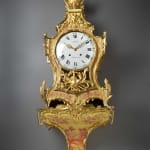Michel à Bourbonne
Literature
Alfred Chapuis, "Histoire de la Pendulerie Neuchâteloise", 1917, p. 175, pl. 135, illustrating a very similar cartel with bracket, the case as here made in France with similar floral vernis Martin decoration housing a Swiss movement by David-Guillaume Engel, La Chaux-de-Fonds.
A rare Louis XVI gilt bronze mounted vernis Martin cartel clock with musical movement and bracket of eight day duration signed on the dial Michel à Bourbonne and numbered 3596 on the musical movement. The white enamel dial with Roman and Arabic numerals and a very fine pair of pierced gilt brass hands for the hours and minutes.
The large and very finely executed visible Swiss made rectangular brass quarter striking clock movement mounted onto the backplate, with silk thread suspension, striking on the hours and quarters on two bells via two hammers and with two additional hammers for the pull repeat to sound the last hour and last quarter, the clock movement attached via a large rod to the equally fine large French made pin barrel, fusee powered musical movement playing a selection of eight tunes on thirteen bells via twenty two hammers, playing on the hour or at request via a lever or muffled via another lever.
The sumptuous French made case and bracket decorated overall with camomile coloured vernis Martin lacquer decorated in le style Pillement with manganese coloured floral sprays on the clock case and on the bracket with more elaborate floral bouquets above a vignette portraying a shepherd herding his sheep over a bridge above a river with trees and hills beyond, the clock case and bracket further ornamented with gilt bronze mounts, the waisted domed clock case surmounted by a vase with pinecone tipped cover and handles à la Grecque hung with floral sprays above a grotesque animal mask head flanked by foliate sprays above foliate scrolled banding and musical trophy encompassing a tambourine, pipes, violin and trumpet or horn ornamenting the pendulum aperture, on foliate scrolled feet upon a waisted bracket mounted with a grotesque animal mask above scrolled banding and a foliate terminal
The case and musical movement: France.
The clock movement: Switzerland, date circa 1775
Height to include bracket 130 cm, width 50 cm, depth 28 cm.
This wonderful clock compares with a number of others of the period that also have a French made case housing a Swiss manufactured clock movement. Some, such as the example illustrated in Chapuis (see above) and others in the same book are signed on the dial with the name of a Swiss clock manufacturer whilst others, such as this example were retailed in France (where the case was also made) and thus feature the name of a French clockmaker. In this instance the clock was retailed by the horloger Michel à Bourbonne of whom surprisingly little is known though he was obviously of great repute as he is recorded in Tardy as clockmaker to Madame de France, which was a generic title given to the daughters of Louis XV. Indeed this clock would have appealed to a woman of standing and one cultivated with an appreciation for music with its beautiful gilt bronze mounted musical trophies as well as the different tunes that can be played on the musical movement.
The decoration of the lacquer work, which is of the highest quality, is known as le style Pillement, so named after the French painter and most imaginative of all Rococo designers Jean Baptiste Pillement (1728-1808). Of French birth, Pillement began his career at the Gobelins tapestry factory but his greatest influence came through engravings after his designs which were widely used and imitated by silk weavers, cotton printers, porcelain painters and marquetry workers. Some of his designs incorporated Chinoiserie designs as well as botanical sprays and rustic vignettes.



